Microsoft Dynamics 365 is an enterprise resource planning (ERP) software that offers modular, subscription-based pricing plans across multiple applications to different business functions.
Financial professionals use Microsoft Dynamics 365 to manage finance, operations, sales, and customer data in one unified system. Its pricing structure is flexible compared to competitors, with scalable options for different company sizes and needs.
This guide covers everything you need to know about Microsoft Dynamics 365 pricing, plans, and costs to make purchase decisions with confidence.
How Much Does Microsoft Dynamics 365 Cost?
Microsoft Dynamics 365 doesn’t offer a single pricing plan. Rather, it’s made up of individual applications, each with its own pricing structure. These include tools for finance, premium sales, customer service, supply chain, commerce, and more.
While no free version is available, Microsoft Dynamics 365 does offer 30-day free trials for many of its applications. Custom pricing tiers are also available for enterprises with specific needs or larger-scale deployments.
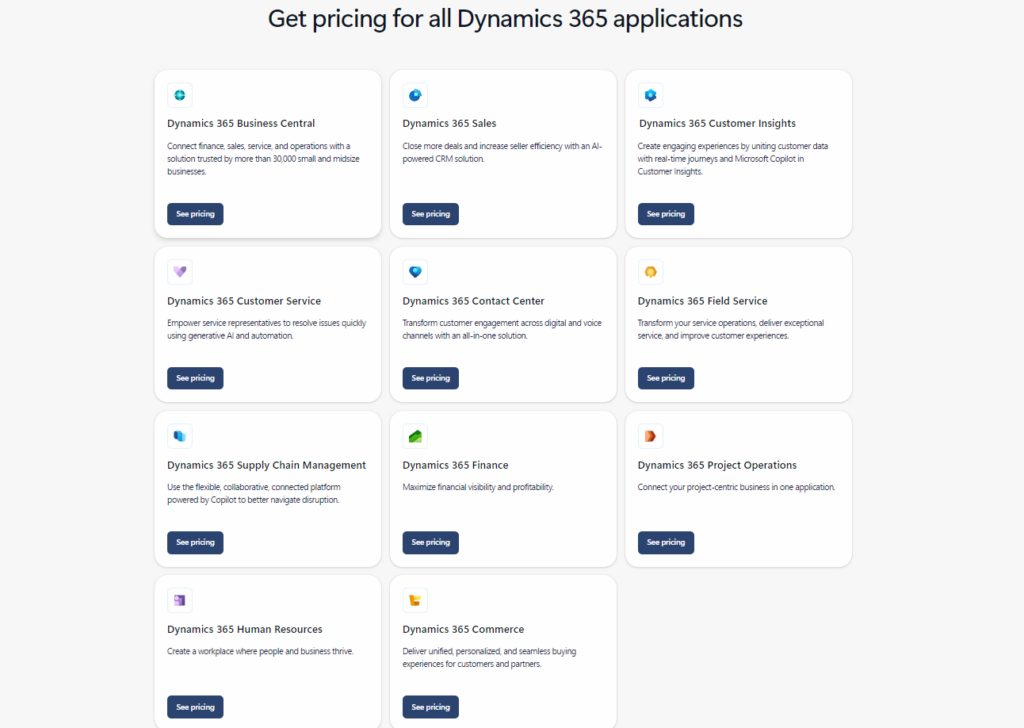
Comparison Chart: Microsoft Dynamics 365 vs. Alternatives
Wondering how Microsoft Dynamics 365 pricing compares to other ERP software? Here’s a comparison chart that breaks down the costs of other ERP software side-by-side:
Our one-on-one guidance will help you find the perfect fit.
Alternatives to Microsoft Dynamics 365
Microsoft Dynamics 365 is a solid ERP software, but there are plenty of other options out there. Depending on your use case, budget, team size, and other factors, you might consider shopping around for a solution that’s better suited to your needs. If you’re looking for alternative ERP software options to Microsoft Dynamics 365, here are a few worth checking out:
- SAP S/4HANA Cloud: Offers strong industry-specific modules and deep customization for large enterprises.
- Oracle NetSuite: Known for its all-in-one cloud ERP platform with strong financial management features.
- Acumatica: Delivers flexible pricing and open APIs for mid-sized businesses seeking scalability.
- Odoo: Provides a modular, open-source ERP system ideal for smaller businesses with development resources.
- Infor CloudSuite: Focuses on manufacturing and distribution industries with built-in industry analytics.
- Workday: Specializes in finance and HR capabilities with a user-friendly interface for enterprise teams.
How to Choose the Right Microsoft Dynamics 365 Plan
When deciding if Microsoft Dynamics 365 will work for you, you’ll want to consider the added value and potential drawbacks. Scrolling through long lists of features can quickly lead to confusion and uncertainty, so here are a few factors to keep in mind as you evaluate and assess your options:
Microsoft Dynamics 365 Scalability and Team Size
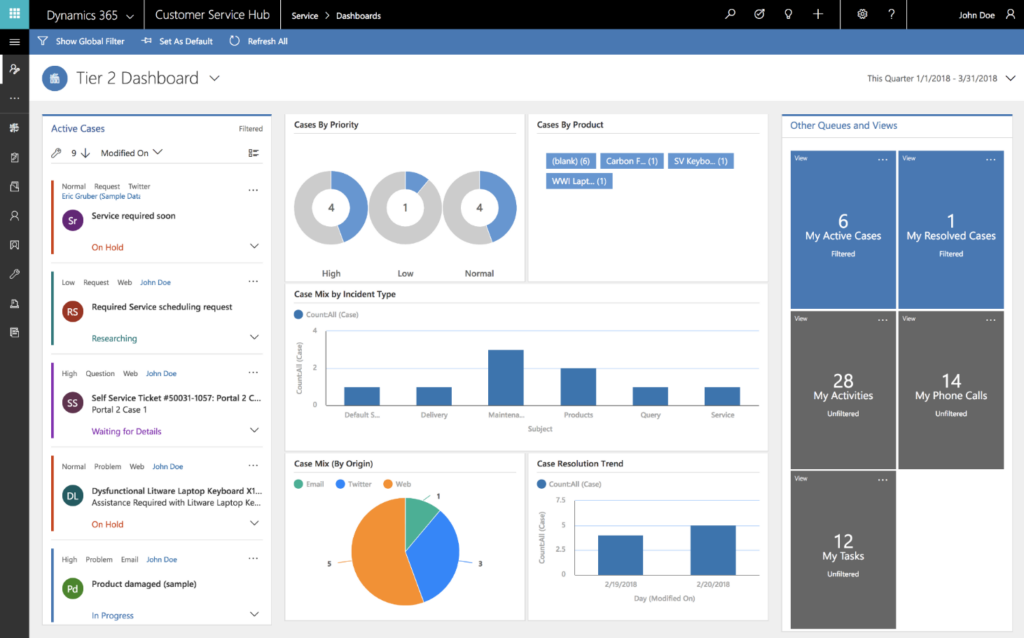
When you start your research, you should first evaluate how Microsoft Dynamics 365 scales with your team’s size and growth.
With Microsoft Dynamics 365, you can add and remove applications as your business grows. To start, smaller teams may benefit from Dynamics 365 Customer Service, Dynamics 365 Sales Enterprise, or Dynamics 365 Business Central, which cover basic CRM and finance needs without high costs.
As your essential operations expand, applications like Dynamics 365 Finance, Dynamics 365 Supply Chain Management, or Dynamics 365 Project Operations can help support more complex workflows and inventory. Lastly, for companies who manage customer engagement at scale, tenant-based options like Dynamics 365 Customer Insights or Dynamics Contact Center are strong add-ons for ongoing interactions and project service automation.
Industry-Specific Microsoft Dynamics 365 Features
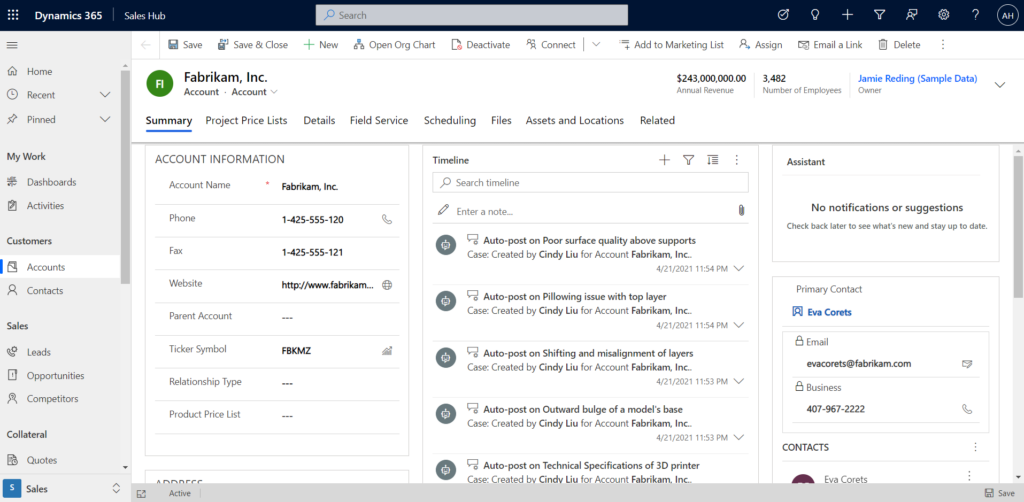
Next, you should assess whether Microsoft Dynamics 365 offers features tailored to your industry.
For example, manufacturers may benefit from the Dynamics 365 Supply Chain Management application, which includes production planning, dashboards, and IoT integration. On the other hand, retail team members can use the Dynamics 365 Commerce and Dynamics 365 Sales business applications for omnichannel sales, customer relationship management, and customer loyalty tools.
Make sure to pick the applications that will work best for your company.
Microsoft Dynamics 365 Integration Capabilities
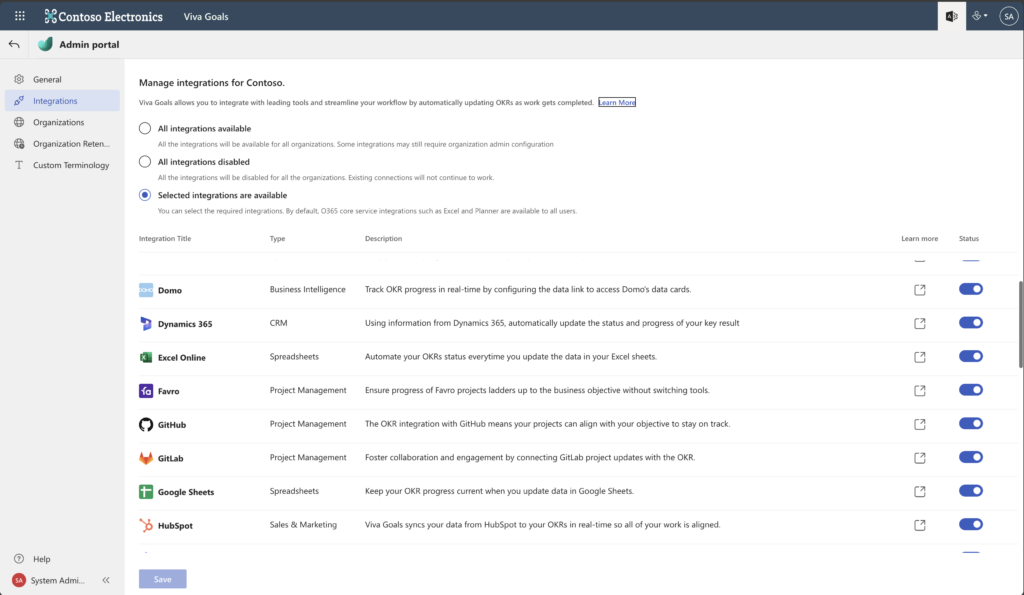
Like with any ERP software, Microsoft Dynamics 365 should also connect easily with your existing tech stack.
The software offers native integrations with other Microsoft tools like Teams, Outlook, and Power BI, which support collaboration, project management, and reporting. It also provides a wide range of APIs for building custom integrations.
While it does not support Zapier, you can use Microsoft Power Automate to connect with third-party tools. Keep in mind that integration options may vary by application and plan, with more advanced features available in higher-tier options.
Microsoft Dynamics 365 Security Safeguards
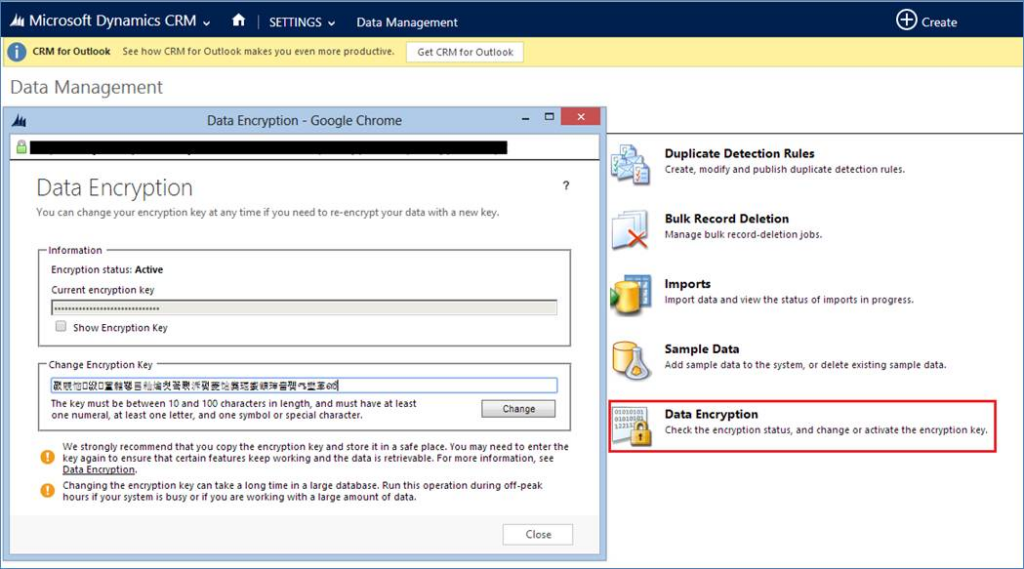
Finally, you and your team should consider the security safeguards included in each Microsoft Dynamics 365 plan.
All Microsoft Dynamics 365 applications offer role-based access control, real-time data encryption, and compliance with industry standards. Other applications, such as Dynamics 365 Finance or Dynamics 365 Customer Insights, include advanced features like audit trails and AI-powered fraud detection.
Remember that most security levels may vary by plan or application, so choosing the right one depends on your data sensitivity and regulatory needs.
Microsoft Dynamics 365 Pricing FAQs
Here are answers to a few common questions about Microsoft Dynamics 365 pricing:
What additional costs should I anticipate with Microsoft Dynamics 365?
In addition to per-user subscription fees, you may encounter costs for implementation services, training, add-on modules, and storage. Some features require integration with other Microsoft products like Power BI or Microsoft 365, which may have separate licensing costs. Custom development or API usage may also involve additional charges depending on your configuration needs.
Are there any discounts or promotions available for Microsoft Dynamics 365?
Microsoft offers discounted pricing for qualified nonprofits and educational institutions. Volume licensing discounts are also available for organizations that purchase multiple Dynamics 365 applications or bundle them with other Microsoft services. These offers typically require working with a Microsoft partner or sales professional/representative.
How often does Microsoft Dynamics 365 change its pricing structure?
Microsoft does not follow a fixed schedule for pricing updates, but changes are typically announced during product updates or fiscal year planning. The last major update to the pricing structure occurred in 2023, with new tiers and Copilot features added. Pricing adjustments have historically been infrequent but tend to reflect product enhancements.
Does Microsoft Dynamics 365 require a long-term contract?
Microsoft Dynamics 365 plans/licensing models are typically billed annually, though monthly billing options may be available through Microsoft partners. Most plans do not require multi-year contracts, but discounted pricing may depend on longer-term commitments. Custom contracts may apply to large enterprise deployments.
Can I mix and match different Microsoft Dynamics 365 applications?
Yes. According to Microsoft’s licensing guide, you can explore and license individual applications based on your team’s needs. For example, your finance team can use the Finance app while your sales team uses Sales Enterprise. Each app is priced separately, but Microsoft offers discounted pricing when you license additional apps for the same full user/user licenses.
Are implementation and onboarding services included in the price?
Implementation and onboarding services are not included in the base subscription price. These services are typically provided by Microsoft partners and vary in cost depending on the scope and complexity of your setup. Some partners offer packaged services, while others price by project or hourly rate.
Is Microsoft Dynamics 365 Good Value?
In my opinion, Microsoft Dynamics 365 delivers strong value for larger organizations that need modular ERP capabilities with deep integration across finance, operations, sales, and field service.
Its pricing is relatively high, especially when licensing multiple apps, but the feature depth in applications like Dynamics 365 Finance, Dynamics 365 Supply Chain Management, and Dynamics 365 Customer Insights justifies the cost for teams with complex workflows.
Financial professionals benefit from the automation, global compliance support, and reporting tools built into the Dynamics 365 Finance app, while manufacturers and retailers gain operational visibility from specialized modules.
Smaller businesses may find the per-user costs restrictive, and implementation can be resource-intensive. However, for enterprises already using Microsoft products, the native integration with tools like Excel, Power BI, and Teams adds significant efficiency. The learning curve can be steep, but support and documentation are extensive.
Verdict: Microsoft Dynamics 365 is best suited for mid-sized to enterprise-level teams with cross-functional needs and the resources to invest in long-term ERP scalability.
Want to learn more about Microsoft Dynamics 365? Check out their site for additional information.
Pricing upon request
30-day free trial
What’s Next?
Ready to compound your abilities as a finance professional? Subscribe to our free newsletter.


